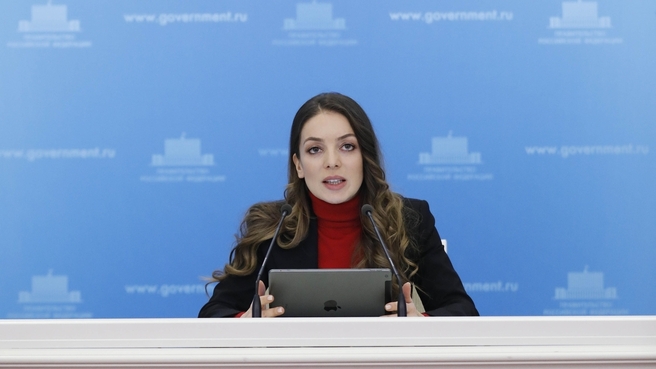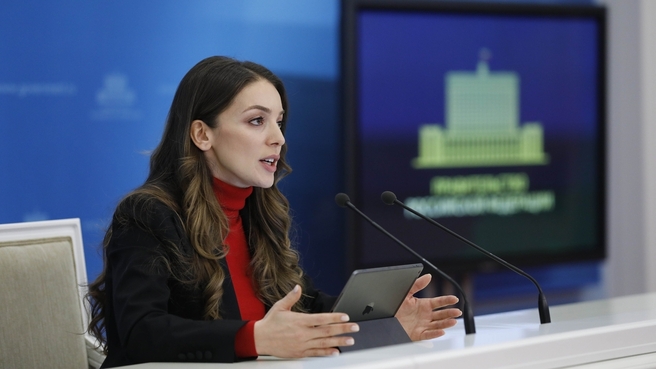The briefing is on support measures for the tourism industry.
Excerpts from the transcript:
Zarina Doguzova: Colleagues, good afternoon.
The outbreak of the coronavirus infection is a serious trial for the entire tourism industry and other related sectors. Every part has been hit: tour operators, tour agencies, cruise companies, hotels, resorts, recreation centres, holiday retreats, health and entertainment enterprises, guides and various kinds of tourist transfers.
During such a time when all the popular tourist destinations are closed, the participants on the market cannot fulfil all their responsibilities for tourists and their employees without state support. This is why we believe that our main job during this unprecedented situation is to provide as much support for the industry as possible, in order for the businesses to stand strong and fulfil their responsibilities, as well as its quick restoration after the crisis.
Back at the beginning of the crisis Rostourism and the Ministry of Economic Development prepared the first package of support measures for tour operators, who, as you are aware, were the first to suffer. I would like to remind you that in this unprecedented situation they quickly, without further delay returned all tourists on organised trips home to Russia, for which we are truly thankful.
Today the Russian Government has approved a package of measures that envisages allocating 3.5 billion roubles from the Government Reserve Fund to refund nonrefundable tickets and to compensate the expenses on returning tourists home.
We hope that the allocated funds will help to compensate for at least part of the expenses and will allow to fulfil their responsibilities before the tourists.
The air carriage accounts for 50 percent of the cost on average of a tour package, so this measure will help businesses during this far from easy situation.
Very soon Rostourism will begin collecting applications from tour operators to refund these losses for foreign flights.
The Government also decided that tour operators can transfer to a later date contributions to the personal assistance funds of the Turpomoshch association as an additional support measure, or use the savings from these funds, on condition that they will continue to refill them. By the way, the money that many tour operators have to pay out in April is quite considerable, so we hope that this additional measure will also help support businesses during this hard time. It is vital to note that some tour operators working in outbound tourism are also developing inbound tourism today, which is our unconditional priority. This is why we believe that all these support measures alongside the tax tools the Government has already put in place will influence the general stability on the market.
Meanwhile, given the scale of the crisis, we understand clearly that these measures will not solve all the problems and are not exhaustive. This is why, today as never before, it is important to look for some alternative decisions that may be comfortable for all parties concerned. A compromise between tourists and sector insiders will help the businesses to withstand this difficult time and allow tourists to take their holidays when the situation returns to normal. Today we can already see that a nucleus of responsible business with its loyal client base has been formed in Russia and it cannot but inspire optimism. For example, many travel companies and tourists have already come to terms on rescheduling their tours at the currency rate as of the time of the tour purchase, which will actually be lower than it would be if it were a new booking. Such an approach seems to us very reasonable and beneficial for both tourists and travel companies.
In addition, tourists and travel companies have already reached agreement on depositing money with additional benefits for travellers. And in this case there is no doubt that the tourists reserve the right to a refund pursuant to applicable laws.
I want to point out that in our estimate no less than 2.5 million people are employed in the tourist sector. Moreover, tourism has become an essential sector in very many regions. Just for this reason we will continue working with the Ministry of Economic Development and the Russian Government to develop a set of support measures for the sector, now with an emphasis on internal and inbound tourism, which we see as unquestionable priorities for development.
The hotel business finds itself in a very difficult situation today. Occupancy and bookings have fallen by as much as 95 percent and even 100 percent in some regions. This is why we are discussing measures to support the hotel industry. And, as one such measure, we, together with the Ministry of Economic Development, are considering subsidies to cover the interest on loans taken for hotel construction and renovation.
We and the industry are working out a programme to revive the tourist sector after the situation returns back to normal. Specifically, we are discussing measures to stimulate internal and inbound tourism. We see the further liberalisation of the visa regime as one of the most important tasks, and this is just what we are working on now together with the Foreign Ministry and other agencies concerned. The Federal Agency for Tourism as well as all other stakeholders in the sector will do everything possible to overcome this crisis.

